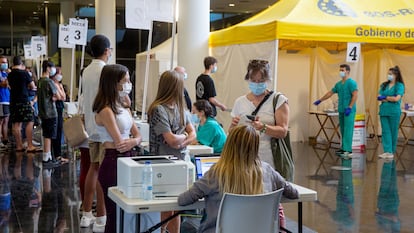Spanish regions reduce gap between Covid infection and vaccine shot in bid to speed up flagging campaign
The measure will allow for the immunization of 500,000 people one or two months after catching the coronavirus instead of the original six months

In the race toward herd immunity from the coronavirus, or at least a return to normality whereby infections end up being a sporadic occurrence, any decision that leads to an increase in the number of people vaccinated is a good one. That’s the view of the experts and also the approach being taken by Spain’s Health Ministry and regions, at a time when there is growing concern over the slowdown of the Covid-19 vaccination campaign in recent weeks.
To combat this drop in the rate of immunizations being administered, people have been able to access the shots without a prior appointment and timetables at vaccination centers have been extended. The latest measure to be added is a reduction in the time that people who have recently had a Covid-19 infection have to wait before they can get their single shot.
This group accounts for nearly 2% of the Spanish population, a figure that, at this stage of the vaccination campaign in Spain, is not as small as it may appear
The latest report from the Health Ministry, which was released on Monday, shows that 225,000 new first doses have been administered since Friday, the lowest figure this summer so far. Five weeks ago, on July 19, the number was as high as 451,000. Until now, the vaccination strategy involved a single dose six months after the person in question recovered, but given the current situation of over-supply – Spain has more than 4.7 million doses in storage, according to the latest report – and the need to combat the virus as quickly as possible, the regions have opted to shorten this time frame.
Death toll rises by 201 victims
What's more, nine of every 10 cases detected in Spain are now the more-infectious delta variant, which continues to spread across the country.
The region with the highest infection rate in Spain is Extremadura, with 482 points. Next is La Rioja, with 405, and the Balearic Islands with 399. Among those aged 20-29, the incidence has fallen 75 points to 525 cases per 100,000 inhabitants over the last 14 days.
In terms of pressure on hospitals, 8,330 patients are currently being treated for Covid-19, which is 164 fewer than Friday. This reduction has not been seen in intensive care units (ICUs), however, where the occupation rate has risen slightly to 20.04%.
In total, there have been 4,794,352 coronavirus infections detected in Spain since the pandemic began, and a death toll of 83,337.
Eight of the 17 regions in the country – Aragón, Asturias, Balearic Islands, Cantabria, Valencia, Murcia, Madrid and La Rioja – will vaccinate this group four weeks after they recover from their infection, while another six – Canary Islands, Castilla-La Mancha, Catalonia, Navarre, Basque Country and Extremadura –will do so after two months, according to their respective regional governments. Castilla y León, for its part, has also decided to bring forward this shot and will administer it between “four and eight weeks” after an infection, according to regional chiefs.
This measure is reserved for the under-65s, while clinical criteria will be applied to anyone over that age. Galicia is still deciding whether to adopt this decision while Andalusia is, for now, the only region that is not planning on reducing the six-month wait, according to its regional health department.
According to estimates made by EL PAÍS based on data from the Health Ministry, these changes will allow for the vaccination of between 500,000 and 600,000 people to be brought forward. Otherwise, this group would have had to wait until the end of this year or the start of the next to be immunized. They are mostly under the age of 40, and became infected during this fifth wave without having been administered a single vaccine shot. The number accounts for nearly 2% of the Spanish population, a figure that, at this stage of the vaccination campaign in Spain, is not as small as it may appear.
Currently, 66.3% of people in Spain have received the full protection offered by the vaccines. Another 11% have not been able to be vaccinated, at least for now, because they are aged under 12 and no vaccines have so far been approved for that age group. The experts estimate that between 5% and 10% of the population will not be vaccinated, either because they do not want to, they have been advised not to on medical grounds, or they have another reason. The aforementioned 2%, then, is a considerable amount in the race to reach and exceed the 80% of the vaccinated population considered necessary to combat the more-infectious delta variant of the coronavirus.
Bringing forward this dose, at a time when there is no shortage of vaccines, is the correct thing to doAntoni Trilla, the head of preventive medicine at the Hospital Clínic in Barcelona
Quique Bassat, an epidemiologist and researcher at the ISGlobal institute, explains that “it is true that those who have had the infection are, in principle, protected. At a time when there are more doses than candidates to receive them, taking this step is a good strategy. The indicators will improve, it will contribute to the creation of a favorable climate for vaccination and it will improve the protection of this group. But we mustn’t forget that what’s important right now is to vaccinate those who have no protection, which includes students ahead of the upcoming academic year.”
Antoni Trilla, the head of preventive medicine at the Hospital Clínic in Barcelona, also backs the change in course. “This dose will improve the immune response in the recipient, which is better than with two vaccines. The time frame of six months was put in place because it was calculated that this was the time that protection would be maintained, but that was before the delta variant. So bringing forward this dose, at a time when there is no shortage of vaccines, is the correct thing to do.”
This expert, however, is very concerned about the slowdown of the campaign in recent weeks. “It’s proving very hard to advance these last few kilometers. We trust that it is all down to the vacation period and that the speed will pick up once more in the coming days.”
The number of fully vaccinated people in Spain saw a notable uptick on Friday, when it rose by 531,000 people – in large part due to an update to the data made by the Andalusia region, which had accidently included single shots administered to the group that had recently had an infection as the first dose rather than fully vaccinated. At the current speed, Spain will exceed 70% of the population vaccinated between the end of August and the start of September. According to the latest report, 35,667,383 people in Spain have received a single shot of a Covid-19 vaccine – that’s 75.2% of the population.
Appointment-free shots
With the start of the school year in September looming, the regions are still trying to increase the speed of the vaccination process to the maximum. In Andalusia, for example, 91 vaccination sites are offering appointment-free shots in order to facilitate the administration of the first dose to residents of the region who are not currently at their home address. Anyone over the age of 12 is eligible.
The Valencia region, meanwhile, has also put its foot on the accelerator and is due to administer 467,767 doses this week – most of them, 341,217, will be first doses for those who have been on vacation or had not updated their contact details, among other reasons. In Galicia, the campaign on Monday moved on to the vaccination of children aged 12 and 13 using the Moderna vaccine.
In Catalonia there are concerns because the speed of the campaign has slowed considerably. Last week, around 250,000 doses were administered – the lowest weekly figure since the end of March. The regional government has admitted that this “rhythm is lower than expected” and has attributed it to vacations and the fifth wave of the coronavirus, which until now has impeded the inoculation of many people who have recently been infected.
With reporting by Bernat Coll, Eva Saiz, Isabel Valdés, Cristina Vázquez and Sonia Vizoso.
English version by Simon Hunter.
Tu suscripción se está usando en otro dispositivo
¿Quieres añadir otro usuario a tu suscripción?
Si continúas leyendo en este dispositivo, no se podrá leer en el otro.
FlechaTu suscripción se está usando en otro dispositivo y solo puedes acceder a EL PAÍS desde un dispositivo a la vez.
Si quieres compartir tu cuenta, cambia tu suscripción a la modalidad Premium, así podrás añadir otro usuario. Cada uno accederá con su propia cuenta de email, lo que os permitirá personalizar vuestra experiencia en EL PAÍS.
¿Tienes una suscripción de empresa? Accede aquí para contratar más cuentas.
En el caso de no saber quién está usando tu cuenta, te recomendamos cambiar tu contraseña aquí.
Si decides continuar compartiendo tu cuenta, este mensaje se mostrará en tu dispositivo y en el de la otra persona que está usando tu cuenta de forma indefinida, afectando a tu experiencia de lectura. Puedes consultar aquí los términos y condiciones de la suscripción digital.









































